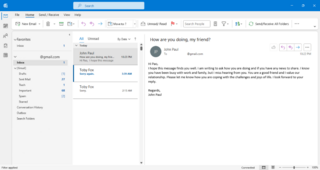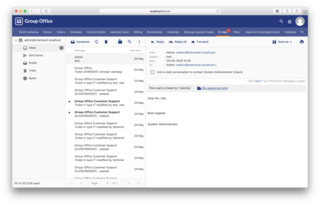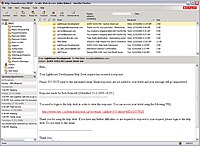
GNOME Evolution is the official personal information manager for GNOME. It has been an official part of GNOME since Evolution 2.0 was included with the GNOME 2.8 release in September 2004. It combines e-mail, address book, calendar, task list and note-taking features. Its user interface and functionality is similar to Microsoft Outlook. Evolution is free software licensed under the terms of the GNU Lesser General Public License (LGPL).

Microsoft Outlook is a personal information manager software system from Microsoft, available as a part of the Microsoft Office and Microsoft 365 software suites. Though primarily being popular as an email client for businesses, Outlook also includes functions such as calendaring, task managing, contact managing, note-taking, journal logging and web browsing.
Messaging Application Programming Interface (MAPI) is an API for Microsoft Windows which allows programs to become email-aware. While MAPI is designed to be independent of the protocol, it is usually used to communicate with Microsoft Exchange Server.

SOGo is an open source collaborative software (groupware) server with a focus on simplicity and scalability.
Microsoft Exchange Server is a mail server and calendaring server developed by Microsoft. It runs exclusively on Windows Server operating systems.
Open-Xchange is a web-based communication, collaboration and office productivity software suite, which enables full integration of email, documents, scheduling and social media.
Calendaring Extensions to WebDAV, or CalDAV, is an Internet standard allowing a client to access and manage calendar data along with the ability to schedule meetings with users on the same or on remote servers. It lets multiple users in different locations share, search and synchronize calendar data. It extends the WebDAV specification and uses the iCalendar format for the calendar data. The access protocol is defined by RFC 4791. Extensions to CalDAV for scheduling are standardized as RFC 6638. The protocol is used by many important open-source applications.

Outlook on the web is a personal information manager web app from Microsoft. It includes a web-based email client, a calendar tool, a contact manager, and a task manager. It also includes add-in integration, Skype on the web, and alerts as well as unified themes that span across all the web apps. It is included in Exchange Server 2016, and Exchange Online
Kolab is a free and open source groupware suite. It consists of the Kolab server and a wide variety of Kolab clients, including KDE PIM-Suite Kontact, Roundcube web frontend, Mozilla Thunderbird and Mozilla Lightning with SyncKolab extension and Microsoft Outlook with proprietary Kolab-Connector PlugIns.

Zimbra Collaboration, formerly known as the Zimbra Collaboration Suite (ZCS) before 2019, is a collaborative software suite that includes an email server and a web client.

Group-Office is a PHP based dual license commercial/open source groupware and CRM and DMS product developed by the Dutch company Intermesh. The open source version, Group-Office Community, is licensed under the AGPL, and is available via SourceForge. GroupOffice Professional is a commercial product and offers additionally mobile synchronisation, project management and time tracking.
Samsung Contact was an enterprise email and groupware server that ran on Linux and HP-UX. It was based on HP OpenMail, which was licensed from Hewlett-Packard.
Zarafa was an open-source groupware application that originated in the city of Delft in the Netherlands. The company that developed Zarafa, previously known as Connectux, is also called Zarafa. The Zarafa groupware provided email storage on the server side and offered its own Ajax-based mail client called WebAccess and a HTML5-based, WebApp. Advanced features were available in commercially supported versions. Zarafa has been superseded by Kopano.
Exchange ActiveSync is a proprietary protocol designed for the synchronization of email, contacts, calendar, tasks, and notes from a messaging server to a smartphone or other mobile devices. The protocol also provides mobile device management and policy controls. The protocol is based on XML. The mobile device communicates over HTTP or HTTPS.
MailSite is a commercial mail server, calendar software, contact manager and collaborative software that was developed by Rockliffe Systems. It was one of the first mail servers to run on Windows NT using Internet standards when version 1.2 was released in 1996. Additionally, MailSite has been in continual development since 1996 with version 10 released in 2013, and runs on a single Windows Server as well as on a cluster of Windows Server computers. MailSite works natively with Microsoft Outlook versions 2007 to 2013 for mail, calendar and contacts without requiring any Outlook plug-ins, as well as including an Exchange ActiveSync (EAS) server for synchronizing mail, calendar and contacts with mobile devices. MailSite also works with Internet Standards-based mail clients such as Mozilla Thunderbird.

Zentyal is an open source email and groupware solution based on Ubuntu Linux.

Mail is an email client developed by Microsoft and included in Windows Vista and later versions of Windows. It is available as the successor to Outlook Express, which was either included with, or released for Internet Explorer 3.0 and later versions of Internet Explorer.
Kopano is an open-source groupware application suite originally based on Zarafa. The initial version of Kopano Core (KC) was forked from the then-current release of Zarafa Collaboration Platform, and superseded ZCP in terms of lineage as ZCP switched to maintenance mode with patches flowing from KC. Kopano WebApp similarly descended from Zarafa WebApp. Since October 2017, Kopano Core is also known more specifically as Kopano Groupware Core, since Kopano B.V. developed more products that were not directly requiring groupware components.
MDaemon Email Server is an email server application with groupware functions for Microsoft Windows, first released by Alt-N Technologies in 1996.







